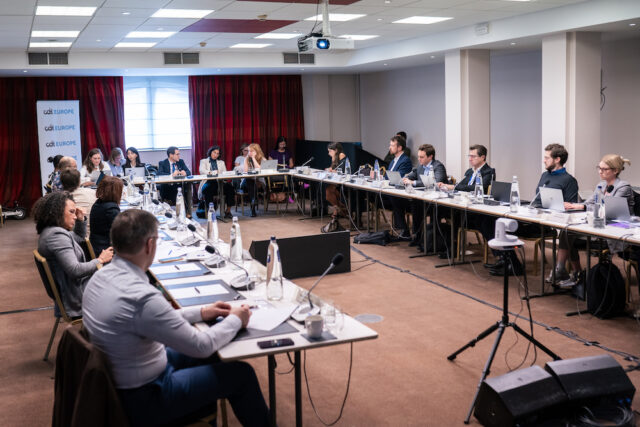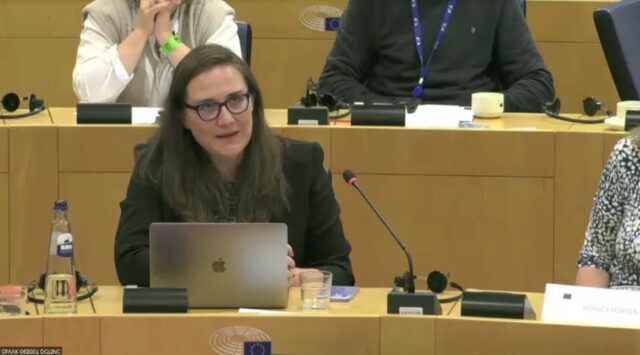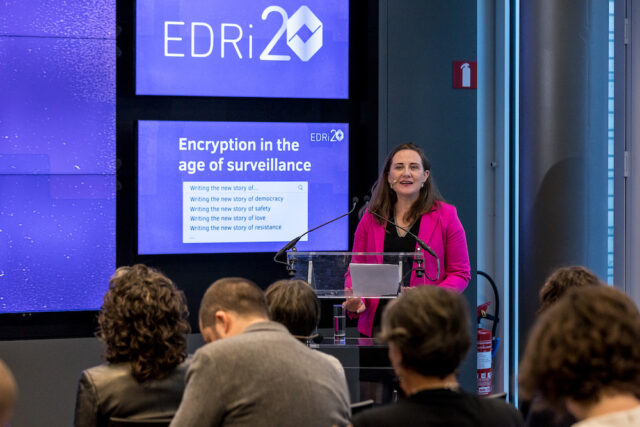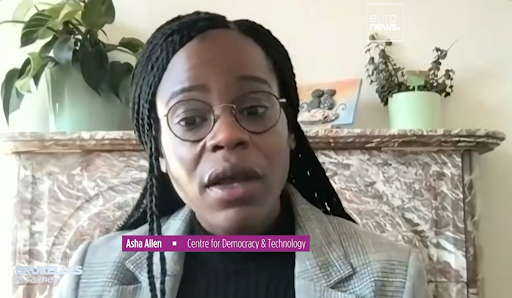AI Policy & Governance, European Policy, Free Expression, Government Surveillance, Privacy & Data
EU Tech Policy Brief: November 2023
This is the November 2023 issue of the Centre for Democracy & Technology Europe‘s monthly Tech Policy Brief. It highlights some of the most pressing technology and internet policy issues under debate in Europe, the U.S., and internationally, and gives CDT’s perspective on them. Our aim is to help shape policies that advance our rights in a digital world. Please do not hesitate to contact our team in Brussels: Iverna McGowan, Asha Allen, and Rachele Ceraulo.
CDT Europe and Open Government Partnership for Europe Host Roundtable on the AI Act

On 11 October in Brussels, CDT Europe held a civil society roundtable on the EU Artificial Intelligence Act and human rights. The event, co-organised with Open Government Partnership and under the official auspices of the Spanish Presidency of the Council of the EU, brought together civil society and EU member state representatives to identify ways to harness and shape the AI Act in order to safeguard fundamental rights and civic space for and against future development and use of AI systems.
The event, which took place at a key moment during the AI Act negotiations, brought together over 15 civil society organisations and 37 EU member state representatives. Moderated by CDT Europe’s Asha Allen and Open Government Partnership’s Paula Perez, the roundtable covered themes including: how to strengthen accountability and transparency measures in the legislation; the need for robust prohibitions on harmful uses of AI; and how to ensure the accessibility and effectiveness of necessary mechanisms for redress of harms.
In her opening remarks, Director of CDT Europe office Iverna McGowan reiterated the importance of establishing the EU AI Act as a truly human rights-based and holistic framework that assures the protection of the most vulnerable and at-risk groups.
The Way Forward for the CSAM Proposal

The European Commission’s proposed Regulation on Child Sexual Abuse Material (CSAM) poses a fundamental risk to basic tenets of criminal law and human rights — this was the key point made by Iverna McGowan, Director of CDT’s Europe office, at the European Data Protection Supervisor’s seminar on the proposal on 23 October.
The event brought together diverse stakeholders to discuss the widespread human rights and privacy concerns raised by the proposal and developments within the legislative process. Speakers included prominent experts, academics, and advocates, alongside representatives from Data Protection Authorities and the European Data Protection Supervisor, Wojciech Wiewiórowski.
Speaking on a panel focused on finding a way forward, Iverna elaborated on the risks that the proposal, as it stands, poses. She highlighted that the legislation has introduced warrantless digital searches, which undermine the need for a warrant based on established suspicion before searching someone’s home or belongings and the presumption of innocence. She reiterated that the draft law’s over-reliance on error-prone and unfeasible technologies would result in significant amounts of content, following a warrantless search, being incorrectly flagged as criminal content and wrongfully forwarded to law enforcement.
CDT in Defense of Encryption

Strong and secure encrypted communications are central to the enjoyment of our human rights, particularly the right to privacy and freedom of expression. Encryption is often an essential tool for various communities across the globe, from human rights defenders to journalists, but also historically marginalised and vulnerable groups. With encryption — as well as government efforts that seek to undermine it — high on the political agenda globally, CDT Europe has been proactively supporting efforts to defend this essential protective tool and our global partners in their activities.
To celebrate the third edition of Global Encryption Day, on 19 October, CDT and fellow members of the Global Encryption Coalition Steering Committee organised “Power to the People: The Encryption Summit”. The event was part of a wider effort to raise awareness about the transformative power of encryption, and celebrate its ability to keep people safe in the digital world. During the event, CDT hosted a panel on how communication service providers can moderate user content without compromising the encryption they offer.
On 26 September, European Digital Rights (EDRi) held an event on encryption in the age of surveillance in Brussels, which brought together leading experts, journalists, and human rights defenders to discuss the importance of encryption for their work and the rights of others. The event was moderated by Director of CDT’s Europe Office Iverna McGowan, and participants had the opportunity to hear from leading experts in the field of encryption such as Meredith Whittaker, President of the Signal Foundation; Dunja Mijatović, Commissioner for Human Rights, Council of Europe; and Carmela Troncoso, Assistant Professor at the Swiss Federal Institute of Technology Lausanne.
EU Leaders Should Uphold Risk-Based Approach in EU AI Act
The European Commission’s compromise proposal to exempt certain AI systems used in high-risk contexts from the EU Artificial Intelligence (AI) Act’s regime for high-risk AI systems is highly concerning. CDT Europe raised the alarm about several aspects of this recent compromise on the AI Act, including that it risks watering down rules linked to applications of AI that would pose the highest risk to human rights. The compromise could undermine the vital protections offered by the Regulation.
The proposed exemptions from the rules for high-risk AI systems have the potential to create confusion or lead to discrimination. They would also burden regulatory authorities with assessing compliance with the high-risk regime, and further incentivise companies to self-assess their AI systems as not high-risk to avoid complying with further requirements.
In order to safeguard the core integrity of the AI Act’s human rights protections, we call on EU institutions to reject the self-assessment provisions and carve-outs for high-risk AI systems, in favour of the risk-based approach the European Commission initially envisaged. We also call on negotiators to integrate mandatory fundamental rights impact assessments into the final text of the AI Act.
Civil Society Letter to Commissioner Breton

In mid-October, European Commissioner for the Internal Market Thierry Breton issued a series of letters addressed to the heads of X, Meta, TikTok, and YouTube regarding the spread of illegal content and disinformation on their respective platforms in light of the escalating crisis in the Middle East. Unfortunately, the Commissioner made a series of missteps in his letters, incorrectly and confusingly invoking Digital Services Act (DSA) obligations to demand swift action from the platforms. In response, CDT Europe commented on the letters in Wired, and joined 29 civil society partners in a public letter urging the Commissioner to respect procedural safeguards and the rule of law when enforcing the DSA.
Most notably, the Commissioner created a false equivalency between illegal content and disinformation, and demanded a 24-hour response to his letters — neither of which are required by the DSA. Breton also referenced ‘crisis measures’, seemingly referring to the DSA’s crisis protocol or crisis response mechanism, both of which empower the European Commission, after consultation with the newly established European Board for Digital Services Coordinators, to require very large online platforms to take certain steps in light of a crisis. However, none of the requirements for enacting these obligations have been initiated or met.
Asha Allen, CDT Advocacy Director for Europe, Online Expression & Civic Space, commented, “This type of public political pressure and confused understanding of the DSA will only foster an environment in which certain platforms will be incentivised to over-enforce their own policies and restrict lawful speech. We know that, in this case, such an approach will likely result in the silencing of human rights defenders, Palestinian activists, and journalists in the region.”
Global Network Initiative In Brussels
Between 24-26 October, the Global Network Initiative (GNI) — a multistakeholder initiative of tech companies, human rights and press freedom organisations, academics, and investors — convened in Brussels, Belgium. Conversations focused on lessons learned from GNI assessments for emerging regulatory developments around mandatory due diligence and corporate accountability to adhere to international human rights standards. CDT Europe’s Director Iverna McGowan moderated a panel on the impacts of European technology regulation on the rest of the world.
CDT Europe also attended the Office of the High Commissioner on Human Rights (OHCHR)’s side event on the UN Guiding Principles on Business & Human Rights (UNGPs), policy coherence, and generative AI. Hearing from an array of Members of the European Parliament, civil society advocates, technologists, and industry representatives, participants discussed the regulatory requirements around AI that are emerging across sectors. They also exchanged on how the UNGPs can be a tool for designing risk assessment methodologies for generative AI.
CDT EU is Hiring!
We are recruiting for two new roles to boost our Brussels-based communications and advocacy. Apply to join us at cdt.org/careers!
- EU Advocacy Internship: This six-month internship (with possibility to renew), under the Belgian “Convention d’immersion Professionnelle” framework, provides a unique opportunity to obtain job experience in the area of EU tech policy and law, human rights, and democracy.
- Advocacy and Communications Officer: This position offers an exciting opportunity to get involved in promoting human rights and democratic principles through advocacy and communications at the EU level around key files relating to the functioning of online platforms, artificial intelligence, electronic communications, and the internet as a whole.


